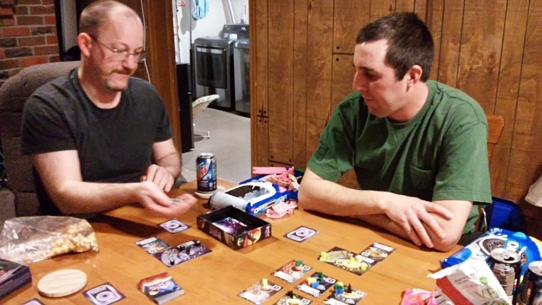The guys and I tried out Tiny Epic Galaxies tonight (the base game only, with none of the expansion material). It was the first time for Nick, Tim, and myself, but Mike had played it a few times before with his family. My overall impression of it is that it’s pretty good. Gamelyn Games’ trademark is big gameplay in small packages, and there are several entries in the “Tiny, Epic” brand. Tiny Epic Galaxies certainly delivers on this promise. I’m familiar with Gamelyn from backing the second edition Kickstarter for Tiny Epic Kingdoms. Galaxies has some similar themes mechanics-wise, but the gameplay between the two games is different enough to make it worth owning both.

Nick rolls dice with the fate of the galaxy while Tim looks on.
Players have a limited number of ships which they move to any planet currently in play in order to collect resources and to either take advantage of the special power it offers or attempt to take control of it by spending resources. Similar to King of Tokyo/King of New York, players have a pool of dice which they use to randomly determine which actions are available to them that round. Taking control of a planet not only gives them access to additional actions, but, more importantly, scores victory points for them. Effective gameplay is heavily dependent on correctly deciding which planets to vie over for control and which to use in the short term. The variety of basic actions and the way they interact with special abilities granted by planets creates some potentially heavy decisions to crunch later in the game.
Another mechanic, and one that I haven’t seen before, allows players to perform the same action that another player chooses during their turn. It’s somewhat similar to the core mechanic in Puerto Rico where the active player chooses an action to perform and gets a bonus and everyone else follows suit. But the twist in Galaxies is that copying actions is optional and players must spend resources to do so. Much of the game revolves around weighing the trade-off between time and material that Garry Kasparov talks about in his book How Life Imitates Chess; chances are pretty good that the dice will be kind enough on your next turn to allow you to perform the same action, for free, but doing it right now might prove beneficial enough to justify spending the resources. The mechanic is executed well and elevates the gameplay from rote, economic engine-building into something deeper and more engaging, despite not really being thematic in any way (it’s a sci-fi game; maybe rather than “following”, they could have called it a rift in the space-time continuum or something along those lines).
We got two games in last night, and it was during the second one that I realized my major criticism of this game*: Tiny Epic Galaxies suffers from a phenomenon that I’ve seen cropping up in games in the past five years or so. I’m planning on writing a more detailed essay about this, so I won’t go into too much detail here, but essentially, it involves mechanics where different types of resources or even actions are interchangeable with other types.
In Galaxies, there are four types of resources which are used to perform actions or take control of planets: energy, culture, diplomacy, and economics. They each have different uses… sort of. Energy and culture are used to upgrade your empire (essentially, allowing you to take more actions on your turn by giving you access to more dice and ships). Diplomacy and economics are the “resources” that must be collected (rolled on the dice) and spent in order to take control of a planet. So far, mostly good.
The problem is that the names are simply placeholders; the only difference between diplomacy and economics is… well, nothing actually. The difference is that some planets require a set amount of one in order to be conquered, and other planets require the other. There is no mechanical difference between the two; they could have just as effectively been called “Red Macguffins” and “Blue Macguffins”. There are even planets that allow you to exchange one for the other. Combined with so many other options, interactions, and combo chains,the resources and special abilities really don’t feel unique and the net result is that everything just starts to blend together. If there were even just a minor mechanical difference between diplomacy and economics, it would probably have been alright.
Despite its flaws, Tiny Epic Galaxies provides a good deal of enjoyment and replayability and is a good value for its pricetag. It’s not quite a heavy game, but its physical stature belies the depth of its gameplay; it’s a solid middle-weight game that can be the sole attraction for a game night. We all had fun playing it last night, and I genuinely look forward to playing it again.
*And it wasn’t just because I suffered a caffeine crash which caused my brain to basically shut down, completely gimping my ability to play well, resulting in my scoring a whopping six points at the end — one-third as many as Mike and Tim who tied for second place. Nor was it borne out of an irrational hatred of this game because on my final turn, on 18 dice rolls, I didn’t roll a single instance of the action I only needed to perform once which would have boosted my final score to nine points, which would have at least given me a moral victory despite having finished in last place.